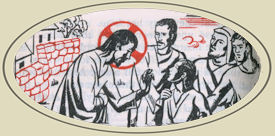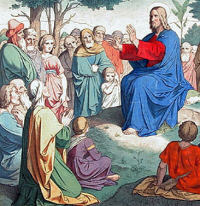» Enjoy our Liturgical Seasons series of e-books!
Jesus immediately knew in his mind what they were thinking to themselves, so he said, "Why are you thinking such things in your hearts? Which is easier, to say to the paralytic, 'Your sins are forgiven,' or to say, 'Rise, pick up your mat and walk'? But that you may know that the Son of Man has authority to forgive sins on earth" — he said to the paralytic, "I say to you, rise, pick up your mat, and go home" (Mark 2:8-11).
Click here for commentary on the readings in the Extraordinary Form of the Roman Rite.
Sunday Readings
The first reading is taken from the Book of the Prophet Isaiah 43:18-19, 21-22, 24-25. The prophet is in Babylon with the exiles and is encouraging his fellow sufferers with words of hope and consolation.
The second reading is from the Second Letter of St. Paul to the Corinthians 1:18-22. In today's excerpts from his letter we find the Apostle asserting under oath that he was not fickle and changeable. He and his companions taught the truth for they taught Jesus Christ who is absolute, existing truth. Paul's commission to preach the gospel to the Corinthians came from God himself; and the Spirit of God was with him in his missionary activities guaranteeing success.
The Gospel is from St. Mark 2:1-12. In this incident we have the fundamental dogma of our Christian faith, namely, that Christ was the Son of God, stated by no less an authority than Christ himself. He had said to the paralytic: "your sins are forgiven"; straight away the Scribes, who knew their Old Testament, objected. This was blasphemy. They said: only God can forgive sins, for all sins are committed against God and it is only the offended person who can forgive an offense; this man is claiming to be God. This was surely blasphemy, for according to them this man was not and could not be God. Christ, in his answer, proved to them how wrong they were. First, he showed them that he knew the thoughts they had in their minds—they had not expressed their feelings openly. Secondly, he asked them which was easier to say and to say effectively: "your sins are forgiven," or "rise, take up your pallet and walk"? Both effective statements required divine power. To prove that he had that power, and to prove it in a way that was visible to them (they could not see whether the man's sins were forgiven or not) he went on: "But that you may know that the Son of man has authority on earth to forgive sins"—he said to the paralytic—"I say to you rise, take up your pallet and go home." The sick man arose immediately, took up his stretcher and walked away in the presence of that huge crowd.
Whether the Scribes were among those who "were amazed and who glorified God" because of what they had witnessed, is doubtful. They were hardhearted and full of pride and therefore, found the reversing of the judgments more than difficult. But we can leave them to the mercy of God. For ourselves, we can thank our divine Lord for giving us this clear proof of his divinity. He claimed to be God, when he forgave sins; he proved that claim by an outstanding miracle. He would have worked this miracle of mercy even if the Scribes had never interfered, but he tells them that he is about to work it to prove to them that he is divine. By a single word of command, given on his own authority, the paralysis leaves the sick man and he is healed instantly—a visible proof of Christ's claim to be God.
This is but one of the many proofs of his divinity which Christ gave to his disciples, and through them to us, during his public ministry. His claim to be divine was well known to his enemies, it was in fact the principal charge on which they had him crucified. "The Jews answered Pilate: we have a law and according to that law he must die because he made himself Son of God" (In. 19:7). They did not say that he was God, they could never admit that, all the evidence notwithstanding; but only that he, falsely of course, claimed to be Son of God.
We who already are firm believers in the divinity of Christ our Savior have no new doctrine to learn from today's gospel. It can, however, fill us with an ever deeper gratitude to God who sent his Son as man on earth, to make us his own adopted sons and heirs to heaven. It should also make us have a greater appreciation of our own value in the sight of God. He wants us in heaven with himself and so he sent his Son among us to make us capable of going there. Christ, his Son, humbled himself so that we should be glorified. Christ bore the cross so that we might get the eternal crown. Christ died an agonizing death that we might have an unending life of happiness.
Is there anything more that God could have done for us? Like the crowd that day in Capernaum, we are amazed at the love God has shown us and the fatherly interest he has in our eternal welfare. Let us imitate the same crowd by glorifying God and his divine Son, who has made us his brothers.
— Excerpted from The Sunday Readings by Fr. Kevin O'Sullivan, O.F.M.
Commentary for the Readings in the Extraordinary Form:
Quinquagesima Sunday
 Jesus said to him, "Receive thy sight, thy faith has saved thee" (Gospel).
Jesus said to him, "Receive thy sight, thy faith has saved thee" (Gospel).
"We are going up to Jerusalem," city of His Great Sacrifice, during Lent. His intimate followers were spiritually blind to the need of a Good Friday.
In this picture we even see them "angrily" trying to hold back one who wanted to "see." To strengthen the weak faith of His disciples, He rewards the strong "faith" of the "blind man." Faith is needed to "see" the need of Lenten penance–faith which lives by love: love for God, love for neighbor (Epistle). Where there is love, there is no labor; but if there is labor, it is loved. The Introit, Prayer and Gradual inspire us with confidence as we too, "go up" with faith (Offertory) and charity (Communion Verse).
— Excerpted from My Sunday Missal, Confraternity of the Precious Blood








